Search the Special Collections and Archives Portal
Search Results
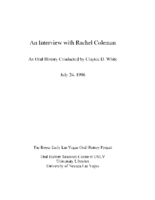
Transcript of interview with Rachel Coleman by Claytee D. White, July 24, 1996
Date
Archival Collection
Description
Interview with Rachel Coleman conducted by Claytee D. White on July 24, 1996. Born in Fayette, Mississippi, Coleman moved to Las Vegas in the 1950s and began washing dishes at the Tropicana. In 1969, having worked for a number of hotels, she was promoted to executive housekeeper at The Hacienda. She ran for president of the Culinary Workers Union Local 226 in 1987. Coleman recalls Las Vegas race and labor relations through the decades.
Text
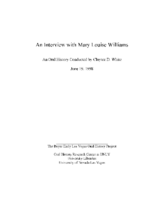
Transcript of interview with Mary Louise Williams by Claytee D. White, June 19, 1998
Date
Archival Collection
Description
Interview with Mary Louise Williams conducted by Claytee D. White on June 19, 1998. Born in Cleveland, Ohio, Williams was musically trained and worked as a dancer at the opening of the Moulin Rouge in 1955. Following her career in social work and teaching in New York, she retired to Las Vegas.
Text
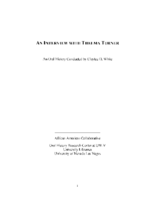
Transcript of interview with Thelma Turner by Claytee D. White, October 21, 2004
Date
Archival Collection
Description
Interview transcript with Thelma Turner by Claytee D. White, October 21, 2004. Turner lived on the Westside, then later moved to North Las Vegas. She talks about her early jobs at the Moulin Rouge and later work at the Town Tavern and Villa d'Este.
Text
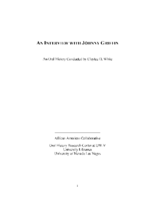
Transcript of interview with Johnny Griffin by Claytee D. White, September 13, 2010
Date
Archival Collection
Description
Interview transcript with Johnny Griffin by Claytee D. White, September 13, 2010. Griffin grew up in Mississippi where he held a job as a golf caddy. He earned a golf scholarship to Jackson State University, and moved to Las Vegas in 1982. He became involved in Municipal Golf Course and the Tiger Woods Foundation.
Text
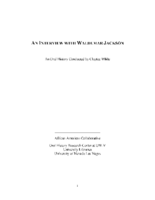
Transcript from interview with Waldemar Jackson conducted by Claytee D. White, May 5, 2013
Date
Archival Collection
Description
Transcript from interview with Waldemar Jackson by Claytee White on May 5, 2013. Jackson's family was one of the first black families in the West Las Vegas neighborhood Vegas Heights. Jackson joined the Air Force and traveled overseas, encountering racism. He returned to Las Vegas and his employment history includes construction, slot floor man at the Marina, aircraft fueler and baggage screener. He discusses his troubles with substance abuse since his mother's death in 1999.
Text
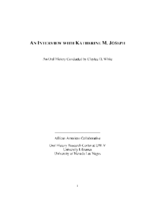
Transcript from interviews with Katherine M. Joseph by Claytee White, October 25, 2004 and September 5, 2007
Date
Archival Collection
Description
Two-session interview with Katherine M. Joseph by Claytee White, October 25, 2004, and September 5, 2007. Joseph is a community activist and was a co-worker of Lubertha Johnson, and involved with Operation Independence. In the interview, Johnson discusses her family, her employment, and life on the Westside.
Text
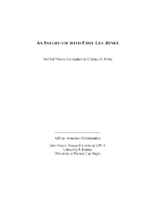
Transcript from interview with Essie Lee Jones by Claytee White, June 5, 1996
Date
Archival Collection
Description
Essie Lee Jones moved from the Tallulah, Louisiana, area to Las Vegas in 1969. In the interview, Jones discusses her employment in various positions such as maid, waitress, and casino porter at the Stardust, Frontier, and Aladdin Hotel/Casinos.
Text

Transcript of interview with Walter Weiss by Claytee White, November 2, 2010
Date
Archival Collection
Description
In this interview, Walter Weiss discusses how Judaism and boxing kept him out of trouble in his youth. Weiss grew up in the Boston area, and started boxing as a teenager. Weiss talks about his boxing training, becoming a runner for a bookmaker, and coming to Las Vegas in the 1950s to be a bookmaker for the Stardust Hotel, and working the slot machine floor. He had several different jobs in various casinos, and discusses different people involved in the gaming industry in Las Vegas.
Walter Weiss life story begins in a Malden, Massachusetts during the Great Depression. His early background was a blend of observant Judaism, secularism, and the effects of the era. He was a troubled youth whose older brother encouraged him to join him in boxing. As Walter explains: I was a wild kid and ... boxing saved my life. His aptitude for boxing led him to be a sparring partner in New York City's famous Spillman Gym. There he met and worked out with some of the greatest fighters of the era, including Rocky Marciano. He recalls how he turned professional while attending the University of Miami and how he first came to Las Vegas in 1958 to escape his personal troubles and find work with a local bookmaker. Thus began his diverse employment history in the casino industry. He details his various positions and the cast of famous and infamous characters of the times. For six years he return to New York and worked as a Wall Street broker before arriving back in Las Vegas in 1973. He talks about his property ownership, lobbying for an amendment to Senate Bill 208, his personal religious changes and a sundry of observations about the changes that occurred as the state took over gaming.
Text

Transcript of interviews with Louis Wiener, Jr. by Eleanor Johnson, January-February, 1990
Date
Archival Collection
Description
In this multi-part interview, Louis Wiener, Jr. discusses coming to Las Vegas from Pittsburgh at a young age, attending Las Vegas High School and University of Nevada Reno. He attended law school at University of California at Berkeley and passed the Nevada State Bar in 1941. He established a practice, Jones, Wiener and Jones, with Bob Jones and Cliff Jones and later with Herb Jones. He had another practice with Neil Galatz and Dave Goldwater, retiring in 1988. Wiener had other business ventures that allowed him to do pro bono work as a lawyer. Wiener discusses his family, including former spouses, his children, and various aspects of his career as an attorney in Las Vegas, representing hotels in the Greenspun antitrust lawsuit, and as an attorney for Bugsy Siegel. He says of his success, "I'm just lucky. I was here at the right time and I picked the right people to help."
Text

Transcript of interview with Gary Sternberg by Barbara Tabach, February - April, 2015
Date
Archival Collection
Description
In this oral history, Gary explains how the family came to live in the United States?Cleveland and Los Angeles. In 1957, he married Noreen and they eventually came to live in Las Vegas where Gary worked for Sears selling washing machines, had a repair business and an importing business with Noreen. Gary was an entrepreneurial soul and inventive much like his father. He owns three patents.
On August 25, 1931, Augusta and Herman Sternberg welcomed their second child, Gerd (aka Gary), into the world of Cuxhaven, Germany. Augusta was a devout Christian of Polish ancestry who had fled Russian persecution. Herman was a German-born Jew salesman and inventor. The couple fell in love and had two children, Gary and Ruth who was a year and half older. By 1938, German politics were targeting Jews and Herman was ripped away from his Christian wife and children and sent to a concentration camp. Fate and friendship rescued Herman with the option to go to China. And so begins the history of the Sternberg family and how they all would eventually live together during World War II in the confines of a Jewish ghetto in Hongkew, China from May 1939 to July 1948. Gary had an extraordinary career as a dealer. He was not the stereotypical young dealer-to-be: he was in his 40s when he signed up for the Michael Gaughn Dealing School in the mid-1970s. Gary?s charming wit and ease of making friends soon gained him a position at El Cortez and then Caesars Palace. It was the same personality that would sustain his stellar thirty-one year career at Caesars. He was employed there from April 1974 until his retirement May 8, 2005. Though Jewish tradition would identify Gary as Christian, he self-identified as Jewish, officially converted and has been an active member of the Jewish community. Among his anecdotes-and he has many-is one about securing a $30,000 donation from Frank Sinatra and Jilly Rizzo for Congregation Ner Tamid.
Text
